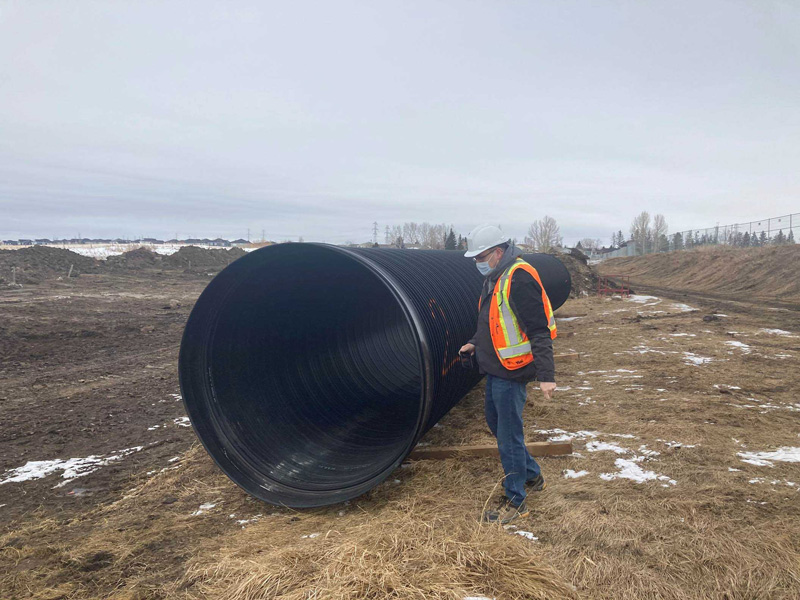Stage one of the Western Irrigation District (WID) Cooperative Stormwater Management Initiative (CSMI) south of Chestermere Lake has now begun.
The work is currently focused in the canal areas near Range Road 282 and Kinniburgh Blvd., and includes excavation, removal of material, and the installation of new stormwater management materials.
“Stormwater is rain and melting snow and ice. Some of it soaks into the ground, but we want to store the rest in ponds, puddles, or reservoirs until it can be released, without impacting the community at large,” said Jacquelynn Twarzynski on behalf of the WID.
“As more development happens, more stormwater is generated and it needs to have somewhere to go,” she said.
The CSMI was developed to manage stormwater in a proactive and coordinated way across the region.
“Water doesn’t stop flowing when it hits the edge of a municipal boundary. We needed a cooperative approach,” Twarzynski said.
Adding, “For the WID and the municipalities, we want to keep stormwater separate from irrigation water. This will maintain the excellent irrigation water quality that the WID has now.”
The goals of the CSMI are to maintain irrigation water quality, prevent flooding, prevent erosion of rivers and streams, and enable municipal development.
The CSMI system is designed to reduce localized flooding through collecting, storing, and moving stormwater more effectively throughout the region.
Stormwater will be kept out of the WID irrigation canals as it is conveyed through the CSMI system, which will preserve high-quality irrigation water in the WID canals.
The WID is participating in the collaborative initiative with several municipalities to build a network of pipes and canals to move stormwater through the region without impacting irrigation water quality as development continues.
More than $13 million has been received from federal and provincial grants to fund the initial stages of construction, which is to build infrastructure at the south end of Lake Chestermere.
The work being done at the south end of the lake is expected to be completed by the early spring.
The next stages of the CSMI are to build regional infrastructure that will occur over the next several years, outside of the Chestermere area. The full system will be built over the next 25 years as funds become available.
“This is a very long-term collaboration to work together to manage regional stormwater in ways that make sense for the long-term health and development throughout the region,” Twarzynski said.
The CSMI is a partnership between the WID, The City of Calgary, Rocky View County (RVC), and the Town of Strathmore.
All three municipal councils and the WID Board approved the project in November 2020, and legal agreements were solidified by December 2020.
“The CSMI project represents a significant opportunity for the WID and the communities it serves to demonstrate that development can coexist with irrigation through collaboration,” said the general manager of the WID, David McAllister.
“The City of Calgary values this collaborative approach to sustainably manage stormwater that will be important for economic development, flood management and watershed health as the region grows,” said the Manager of Watershed Planning, Water Resources for the City of Calgary, Carolyn Bowen.
“RVC supports this regional stormwater management project since it provides a stormwater outlet for our growth plans that is sustainable and safe,” said the Executive Director, Operations of RVC, Byron Riemann.
The CSMI was recently granted an additional $4.1 million from the Alberta Community Resilience Program and $200,000 from the Alberta Community Partnership.
With the newly accrued funding and the approval of the governing legal agreements by each partner, the CSMI could proceed with implementing a system to manage stormwater for the protection of Alberta’s rivers, land, and communities.
For the next several weeks, anyone driving or walking through the Range Road 282 and Kinniburgh Blvd., area should use additional caution, and watch for signage.
There will be some temporary closures of pathways, and the gravel road north of the intersection of Range Road 282 and Kinniburgh Blvd., will be closed until April 11.









